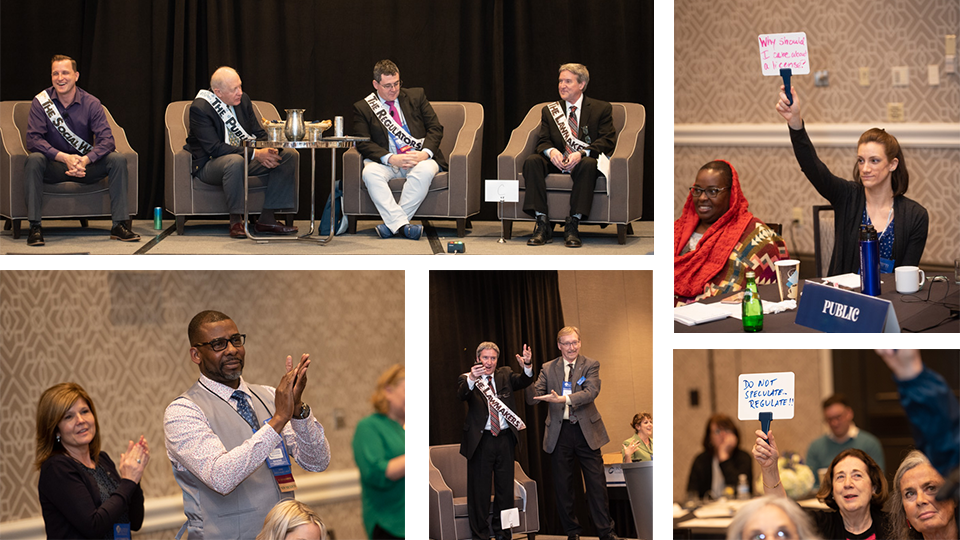Taking a point of view, telling a story

The 2019 Education Conference wrapped up on Saturday afternoon with an active, participatory session designed to solidify the points of view participants had learned about during the previous conference sessions. Moderator Jennifer Henkel, senior director of member services and strategic initiatives, introduced the four-speaker panel, affectionately calling them a “man-el.”
She assigned the speakers and participants to the roles of regulator, public, social worker, and lawmaker. “We’ve had several sessions about what to say, who to talk to, how to talk to them,” Henkel said. “This session is really about switching up points of view.”
So that attendees could easily identify the alter ego each speaker portrayed, panelists were outfitted with beauty pageant–style sashes, made by Kacie Beck, a continuing education specialist at ASWB. Attendees were also assigned to different roles and were equipped with whiteboard paddles for sharing comments with the room. Henkel exhorted everyone to stay in character and respond from their assigned points of view. “I don’t want you all to respond like the regulator,” she said. “I want you out of your comfort zone, unless of course you’re in the regulator section. You are going to get an opportunity to act like a lawmaker, talk like a social worker, be a regulator, or be your public voice.”
“We've had several sessions about what to say, who to talk to, how to talk to them. This session is really about switching up points of view.”—Jennifer Henkel, ASWB Senior Director of Member Services and Strategic Initiatives
The session included video clips to teach and to prompt responses. One clip presented techniques for creating an effective elevator pitch. Panelist Dan Rutz expanded on the video’s message, sharing that storytelling, rhymes, brands, and logos, “are a way of cutting through the clutter and making the brain remember.” Throughout the session, participants took his advice to heart, jotting clever rhyming slogans on their whiteboard paddles.
Participants also watched the 2018 testimony of Bob McNamara, a senior attorney with the libertarian Institute for Justice, before the House Subcommittee on Higher Education and Workforce Development. Participants were challenged to respond to McNamara’s arguments against occupational licensing. Posing as a lawmaker, panelist Dale Atkinson voiced his agreement with McNamara. Rutz, portraying a member of the public, said, “It’s about time that Big Brother gets out of my face and lets us alone.”
As the regulator on the stage, panelist David Benton found a point of agreement with McNamara—even as he pointed out that the speaker relied on outdated statistics. “Mr. McNamara makes a really important point … we need to be really focused on harm to the public, using the least restrictive approach.”
And panelist Fred Phelps pleaded the social worker’s case, pretending to assert that licensing is unnecessary. “I know what I’m doing in my job, and my employer will hold me accountable, and so will the market.”
Later in the session, volunteers stepped up to microphones to attempt to deliver short elevator pitches, trying out the techniques discussed. Roxroy Reid of New Mexico gave an elevator pitch that included storytelling about how the knowledge that police were monitoring his car’s speed as he drove to the airport prevented him from breaking the law. “That put in my head a sense that I am regulated,” Reid said. “We want police officers, we want regulation, we want someone holding us accountable for our actions. Therefore, as regulators, we need to [understand] that we are preventing the kind of harm that we hear about in social work.”
A final video presented arguments against occupational licensing by economist Morris Kleiner. Benton, who has met with Kleiner, said Kleiner used outdated data. Benton cited recent research that demonstrates the benefits of licensure and fails to find that licensure has a negative economic impact on practitioners. “There’s much newer work which actually demonstrates that many of the things that Morris claims licensing does, in fact, are not the case,” Benton said. “Beth Redbird, who has published another paper recently using very large data sets, demonstrates that there’s not in fact an economic incentive in terms of moving to licensing, that licensing does in fact open up opportunities for people from ethnic minority backgrounds because it’s a level playing field.”
Henkel wrapped up the engaging session by noting that the four points of view represented onstage were only a beginning. “I created these four points of view, but those are broad; those are not specific enough,” she said, suggesting the next step would be to seek out the perspectives of insurers, researchers, and educators.
Benton agreed, adding, “The power of information is critical, and we’ve got to get a lot better at it. We’ve got to be able to present it not as complex statistics, but as something that can be understood by the public and others. That’s the challenge for all of the regulators.”

